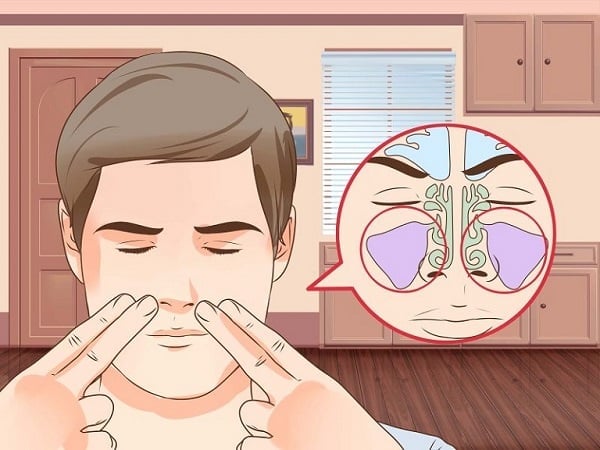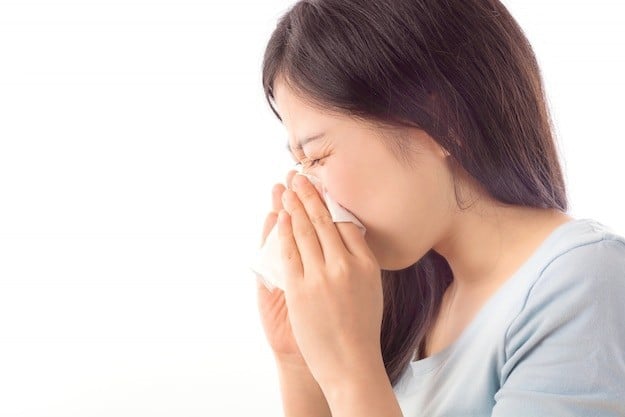There are 4 types of sinuses: frontal sinus, ethmoid sinus, sphenoid sinus, and maxillary sinus. Although sinusitis does not cause serious health consequences, it makes the patient's life and work difficult and uncomfortable. If you know how to handle it, you will minimize that discomfort and avoid recurring sinusitis .
Causes of sinusitis
There are many causes that can lead to sinusitis:
- Upper respiratory tract infections caused by viruses, bacteria, fungi...
- Due to weather allergies and allergies to other foreign objects.
- Tumors, excess flesh; deviated nasal septum…
- Any reason that obstructs the flow of air into and out of the sinuses causes the fluid to not drain quickly enough, making the sinus opening swell even smaller, and the sinus opening becomes almost blocked.
- Stagnant mucus is a favorable environment for bacteria, as well as some fungi, to grow in the sinuses.
- Allergic reaction to a substance, usually chemicals or spoiled food, causing swelling of the nasal mucosa, sinus blockage and infection. Poor resistance, the body does not have enough resistance to fight bacteria, immune deficiency, respiratory mucosal weakness, autonomic nervous system disorders.
- There are cases of sinusitis as a result of tooth decay, infection of the upper jaw teeth. After trauma there is damage to the sinus mucosa.

Sinuses are hollow, air-filled cavities located behind the cheekbones and forehead.
Prevent and reduce recurrent sinusitis
With sinusitis, the patient will have special pain: pain above the eye socket, on one side and in 2 cycles per day; the pain increases from morning to noon, reaching its maximum level, at which time the nose will run a lot of pus, the sinus will subside and the pain will subside, and in the afternoon the pain will recur. Sometimes accompanied by watery eyes, the eyes will hurt when moving back and forth, the skin in the sinus area will be more sensitive, just touching will hurt, pressing on the nerve above the eye socket in the upper corner - in the eye socket will also cause sharp pain.
When suffering from sinusitis, in addition to symptoms of nasal congestion and discharge, the patient also has a constant headache.
To treat and prevent the disease, you must know these causes to know how to prevent the disease effectively.
What to do:
- Keep the air in the house and bedroom airy.
- In winter, you should use a water sprayer to keep the air from getting too dry.
- Strengthen the body's resistance: Eat healthy, including vegetables and fruits, to strengthen the body's resistance. At the same time, patients should exercise regularly to help the body become healthier.
- Keep your nose and sinuses clean: Use saline or saline solution to keep your nose and sinuses clean.
- Pain relievers and anti-inflammatory medications should be used to relieve sinusitis symptoms. In addition, natural methods such as nasal irrigation and nasal and sinus massage can also help relieve sinusitis symptoms.
- Treatment of related diseases: Treatment of related diseases such as asthma, allergies and allergic rhinitis,...
- Wear a mask when going out.
- Clean your teeth after meals.

When suffering from sinusitis, in addition to symptoms of nasal congestion and discharge, the patient also suffers from constant headaches. Illustration photo.
Things to avoid:
- Limit exposure to allergens and irritants: Limit exposure to cigarette smoke, dust, chemicals and other allergens.
- People with sinusitis should stay away from allergens such as cigarette smoke, gasoline odors, perfumes, dust, dogs, birds, and cats.
- Do not let your body, especially your chest and throat, get cold.
- Also, you should avoid using nasal rinses that contain alcohol or irritants.
- Do not overuse nasal drops. If you use the medicine repeatedly or for a long time, even several times a day, after several weeks of continuous use, the medicine will lose its effectiveness. Worse, the medicine will have the opposite effect, making the stuffy nose worse, becoming rhinitis, which is very difficult to treat. In addition, long-term use of nasal drops can also cause nasal atrophy, septal perforation...
Some ways to reduce the risk of recurrence:
- Use the prescribed medication fully and correctly: It is necessary to use the medication prescribed by the doctor fully and correctly.
- Have a healthy lifestyle: Eat nutritious food, exercise regularly.
- Limit smoking and drinking alcohol.
- Keep your nose and sinuses clean.
- Avoid exposure to irritants: Avoid exposure to allergens and irritants such as cigarette smoke, dust, chemicals and other irritants.
- Surgery: If treatments are not effective, surgery may be required to reduce the risk of sinusitis recurrence.
Source



![[Photo] Hanoi is ready to serve the occasion of the 80th National Day Celebration on September 2nd](https://vphoto.vietnam.vn/thumb/1200x675/vietnam/resource/IMAGE/2025/8/29/c838ac82931a4ab9ba58119b5e2c5ffe)
























![[Photo] Prime Minister Pham Minh Chinh meets with Speaker of the New Zealand Parliament Gerry Brownlee](https://vphoto.vietnam.vn/thumb/1200x675/vietnam/resource/IMAGE/2025/8/28/cec2630220ec49efbb04030e664995db)































































Comment (0)